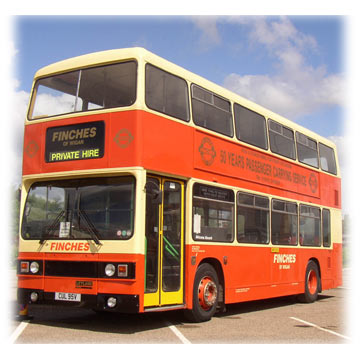Season Tickets and Recreational Travel in Greater Manchester
'A Fare Deal For You' over the last century (Page 4)
Contents
Ticketing Timeline
- Early 20th century: season tickets (or contracts as they were then known) gain popularity among rail commuters;
- 1922: Ashton Corporation introduces a 1/- day rover ticket, allowing a single clockwise/anti-clockwise journey on its trams and some Oldham Corporation joint services;
- 1923: formation of the LNER, GWR, LMS and Southern Railway created by the grouping of 120 smaller railway companies;
- 1948: UK nationalisation of the railways as 'British Railways';
- 1966 - 1969: dawn of one-man operated buses: fareboxes introduced on some services to reduce boarding times;
- 1st November 1969: formation of the SELNEC Passenger Transport Executive;
- 1st April 1974: SELNEC becomes Greater Manchester PTE, with its buses operating under the name of Greater Manchester Transport;
- 1974 - 1975: Bus and Rail season ticket introduced. Today's equivalent is the bus add-on element of any rail season ticket into Greater Manchester;
- December 1975: introduction of the SaverSeven bus and rail weekly ticket, allowing unlimited bus and rail travel within a given zone or zones around Greater Manchester;
- December 1979: the Clippercard is introduced, offering 10 single bus journeys for the price of 9 over given fare stage(s);
- 1981: Greater Manchester Transport, in partnership with the Peak National Park introduce the Peak Wayfarer day ticket, offering a day's unlimited travel by bus and train within Greater Manchester and the Peak District;
- 1982: new Clippercards introduced for off-peak travel (originally the Shop 'n' Save Clippercard) and passengers aged 16 - 18 (under the alias of the Teen Travel Club);
- 1982: Sunday Rover ticket introduced, offering unlimited bus travel on Sundays and Bank Holidays within Greater Manchester for 80p;
- 1983: monthly and annual versions of the SaverSeven introduced (as SaverMonthly and SaverAnnual);
- 1985: Saver Travel Club season tickets and Peak Wayfarer tickets made available at Post Offices;
- January 1986: Teen Travel Club membership limit extended to 19 years. New weekly Teen Travel Club pass introduced (16 - 19 Bus Pass);
- 26th October 1986: the 1985 Transport Act sees the end of Greater Manchester Transport and the dawn of GM Buses: ticketing validity thrown into disarray;
- 1987: Busabout ticket introduced by GM Buses for travel on GM Buses routes only;
- 1989: GM Rail Ranger introduced for travel on off-peak British Rail services within Greater Manchester;
- 1992 - 1993 launch of Network 7 ticket, available for purchase aboard the bus;
- December 1993: GM Buses split into three with Charterplan, GM Buses North and GMS Buses established as separate concerns;
- 1994: GM Buses North introduce 'The Big Orange' weekly ticket with 'slices' and 'segments' covering smaller areas;
- 1995: relaunch of weekly, monthly and annual season tickets under System One Travel name;
- February 1996: GMS Buses sold to Stagecoach Holdings, resurfacing as Stagecoach Manchester;
- March 1996: GM Buses North sold to FirstBus, then present owners of former independent company Pennine;
- September 1998: new day rover tickets introduced by System One for unlimited travel by all buses, buses and trams, buses and trains, plus trains and trams;
- 2004: Clippercard tickets discontinued;
- 2007: System One Tickets made available through shops with PayPoint terminals;
- 12th December 2008: Greater Manchester residents vote 4 to 1 against Transport Innovation Fund proposals possibly ending a Manchester equivalent of London's Oystercard;
Next page: Tickets Past and Present
